Editor’s Note: Goen refers to MSMS’s Goen Hall residence, which primarily houses female-identifying students. Frazer refers to MSMS’s Frazer Hall residence, which primarily houses male-identifying students.
The Mississippi School for Mathematics and Science offers a wide variety of rigorous math classes in the fall semester for incoming juniors, ranging from Algebra II to AP Calculus BC; however, there are staggeringly different gender distributions between entry- and higher-level junior math classes.
The fall Trigonometry and AP Calculus BC classes have a majority Frazer enrollment compared to Algebra II and Foundations with a majority Goen enrollment, a trend which might stem from the annual math placement test or students’ previous educational opportunities.
The Placement Test
To determine which math classes they’ll take in the fall, admitted juniors take the mandatory MSMS math department’s placement test during April’s New Student Orientation. Students visit campus to receive required paperwork and tour the school in the morning. In the afternoon, they are divided into testing rooms to take a one-hour test covering math skills in Algebra I, Algebra II and Trigonometry. After the test, the math faculty members decide whether each junior will take Algebra II, Foundations for Higher Math (Pre-Calculus), Trigonometry, AP Calculus BC or Multivariable Calculus in the fall.
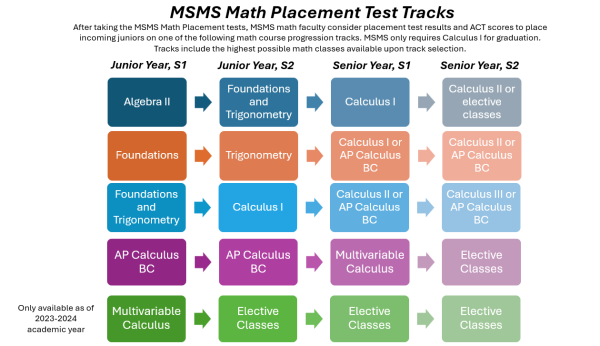
Senior Jeremy Hathorn was placed into Foundations at the beginning of his junior year but said the math placement test may harm students like him by placing them in a class they are not ready for.
“I was pleased to have tested into Foundations, but I ended up deciding to drop down to Algebra II,” Hathorn said. “I previously took a pre-calculus class, [but] I didn’t really learn much in it because it wasn’t rigorous. I came here underprepared by my school.”
Though Hathorn said he believes the test is slightly harmful, MSMS math instructor Lauren Zarandona said it helps the math department with deciding class placement for most juniors and ultimately benefits the students.
“The math placement test is a way for students to show they can advance in math even if their transcript doesn’t reflect certain classes,” Zarandona said. “It’s possible [for] a kid who hasn’t had trigonometry to wind up in calculus, but we wouldn’t know this information if we didn’t test kids.
“Where it appears harmful sometimes is when kids experience testing anxiety and the scores are very low,” Zarandona added.
Yaerim Choi, the only Goen junior who tested into AP Calculus BC, advanced to Algebra III and AP Statistics in her math curriculum prior to MSMS and participated in a variety of math competitions, as well. She said the math placement tests could be considered fair but disadvantages certain students limited by their math classes’ schedule of content.
“I heard many of my peers would have done far better on the test if they were just a week further in their prior math class,” Choi said. “I feel the easier questions should be more applied, and the more technically difficult questions should be more sympathetic of slower pre-calculus curriculums.”
Senior Maryann Dang, who also tested into Foundations, said she was anxious during the test because she came from an underfunded school with a less-than-stellar math program.
“Coming from a more underfunded school with a math program I knew didn’t compare very well to other places, I knew I probably wasn’t going to do as well as my abilities would have permitted me to if I had the knowledge,” Dang said. “While I was taking it, I did what I knew how to do, and everything else was just my best possible work.”
Senior Sai Narla, who was placed into Foundations and Trigonometry, said the placement test may harm students who have an overall bad day on orientation or experience anxiety from outside stressors.
“Some students have a negative conscience during the math placement test, so they may not put out their best efforts to [see] what math they should be placed into,” Narla said. “I was anxious during my test due to outside pressures at home.”
Zarandona said extreme cases of text anxiety have contributed to lower scores and greater consideration for placement.
“Low scores are really unfortunate because it could make us question if a kid is even ready for the class they should be taking based on their transcript,” Zarandona said. “That might be unfair for the student because we’re coming in already questioning their ability. I don’t like how any test score then gets associated with a kid, and I understand why this is a negative, too.”
Dang said the association between a student and their placement test score should not be the ultimate determining factor in placement.
“I personally don’t think a student’s ability can be quantified by one test they take before they even finish their sophomore year of math,” Dang said. “I do think students can be placed in their math classes based off of the placement test, but I think there also should be more leeway based on whether students feel like they can do more and if they can prove they can do more, maybe like with other test scores, or recommendations from their old math teachers.”
Staggering Gender Distributions and Effects
Though gender data is not collected at the time of the test, placement test scores have led to a general trend and stark difference in gender distributions in junior fall semester math classes.
In the 2022-2023 academic year, Trigonometry, one of the highest math classes for juniors, had only one class period in the fall. Only five fall Trigonometry students were Goen residents out of the 22 enrolled. In the same year, AP Calculus BC, the highest-level math class juniors can take, had one Goen junior out of the four juniors enrolled.
Narla said the gender distribution in Trigonometry led to significant differences in the class environment.
“[There were] 14 Frazer residents and 15 Goen residents in my Foundations class,” Narla said. “My trigonometry class, with only five girls out of a full class of 21 students, felt weird because most of the girls never talked, and when they did, the guys always tried to overpower them. They would either joke around or be egotistic or cocky.”
These gender distributions are not present or entirely reversed in spring junior math classes. In Zarandona’s 2022-2023 Trigonometry classes alone, she had three Frazer residents out of the 23 students in one class and nine Frazer residents out of 24 students in another.
These trends have only continued into the 2023-2024 academic year. This year, Trigonometry still had only one period in the fall and enrolled six Goen residents out of 18 total students, and AP Calculus BC enrolled one Goen junior out of two juniors total. This spring semester, Zarandona sees 14 Goen juniors out of 18 students in one Trigonometry class and 13 Goen juniors out of 19 students in another.
Choi said she not only observes significant gender differences in her math classes but believes this disparity manifests in science and math extracurriculars, including MSMS Mu Alpha Theta and Robotics, and has affected her sense of belonging.
“An overwhelming majority of the leaders … for these groups [live in Frazer],” Choi said. “Furthermore, I noticed I miss a lot of discussion beyond these academic settings. Basically, I don’t think I could talk about my struggles with my interests in math and science [with others in my] dorm…other than one person. Being the only junior girl in AP Calculus BC [means] peer help isn’t as accessible.”
For the Class of 2024, though, after one year of progressing through MSMS math curriculum, Goen residents have greater opportunities to pursue higher math through elective courses, given they satisfy certain prerequisites or co-requisites generally met by or achievable for all MSMS seniors. For instance, juniors who get an A in Foundations and Trigonometry can apply to take AP Calculus BC senior year. In this year’s class, five out of 15 students are Goen residents. To take AP Calculus III, students must make a B or higher in AP Calculus II, and there are four Goen residents out of 17 students in this year’s class. Differential Equations only requires Calculus I as a co-requisite, yet only three out of 20 students are Goen residents. Multivariable Calculus, a new course offered this fall, had only six students enrolled across both the junior and senior classes, with two Frazer juniors and only one Goen senior present.
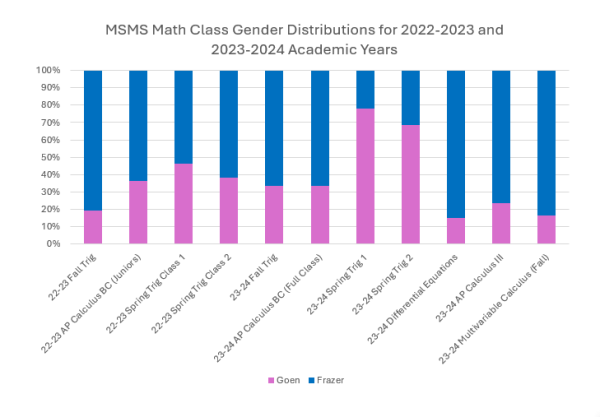
Senior Rhianna Drake, who took Algebra II and Geometry before coming to MSMS, applied for and currently takes AP Calculus BC. She experiences difficulties under gender imbalances, Drake said.
“It’s a bit more difficult to actually work with the [Frazer residents] in my class,” Drake said. “When doing group work, some of them ignore the fact I’m there and just talk to each other.”
Future Equity in MSMS Math Opportunities
Zarandona said these current gender distribution trends are not directly impacted by the math placement but rather by students’ opportunities for higher math classes and competitive math as early as elementary school.
“I think we start to see these trends in fifth grade and up when we start to see competitive math,” Zarandona said. “Girls start to drop out and boys start to take over because the situation maybe just lends itself to boys to feel like [math] is their place, and girls maybe don’t feel like it’s theirs.”
Dang agreed and said the current gender distribution trend may be influenced by older societal norms.
“It’s this overarching idea where it’s just easier for Frazer residents to pursue avenues in STEM because it’s just more targeted toward them and it just appeals to them more,” Dang said. “Even when the opportunities may be a bit more equal, people may think math is a more masculine-dominated field, so it’s just a lot less appealing for Goen residents to pursue.”
Narla said one possible avenue to address the gender distribution gap is admitting more Goen residents who barely missed the cut-off line for Trigonometry into the class.
“I think what the math department’s faculty could do for some students who barely missed the mark is to get them into the Trigonometry class. If any of those students are Goen residents, they could enroll them in the class just to see how they would do,” Narla said. “After the first quarter, if they’re doing well, then they can keep them in the class. And if they don’t, then there could be more discussion about their placement.”
Drake said the math placement test is only useful in deciding which incoming juniors need to take Algebra II, and beyond that, it doesn’t help.
“Students can decide whether they can handle doubling up on Foundations and Trigonometry. That way, students who may not have been as exposed to math could have a chance to advance to Calculus III or higher without needing to take AP Calculus BC,” Drake said. “Not having a choice in your math path makes it more difficult to actually progress, in my experience.”
However, Dang said she believes there is not much else to do to address current gender distributions in fall junior math classes.
“I think it’d be great if more Goen residents were in [higher-level] math classes, but I don’t think it’s something MSMS can particularly control,” Dang said. “It’s not something MSMS can change besides maybe encouraging more Goen residents to pursue [higher math] avenues. People just score on the placement test what they score, regardless of gender differences.”
Drake said greater encouragement geared toward Goen residents could limit the disparities.
“Honestly, it feels like Frazer residents are usually more encouraged to take higher math classes than Goen residents,” Drake said. “In fact, [in] my junior year, a lot of people were warning me against taking AP Calculus BC while I didn’t see that happening with my male peers. I believe if other people showed the same confidence in Goen residents [as] Frazer residents, more would be in the higher math classes.”



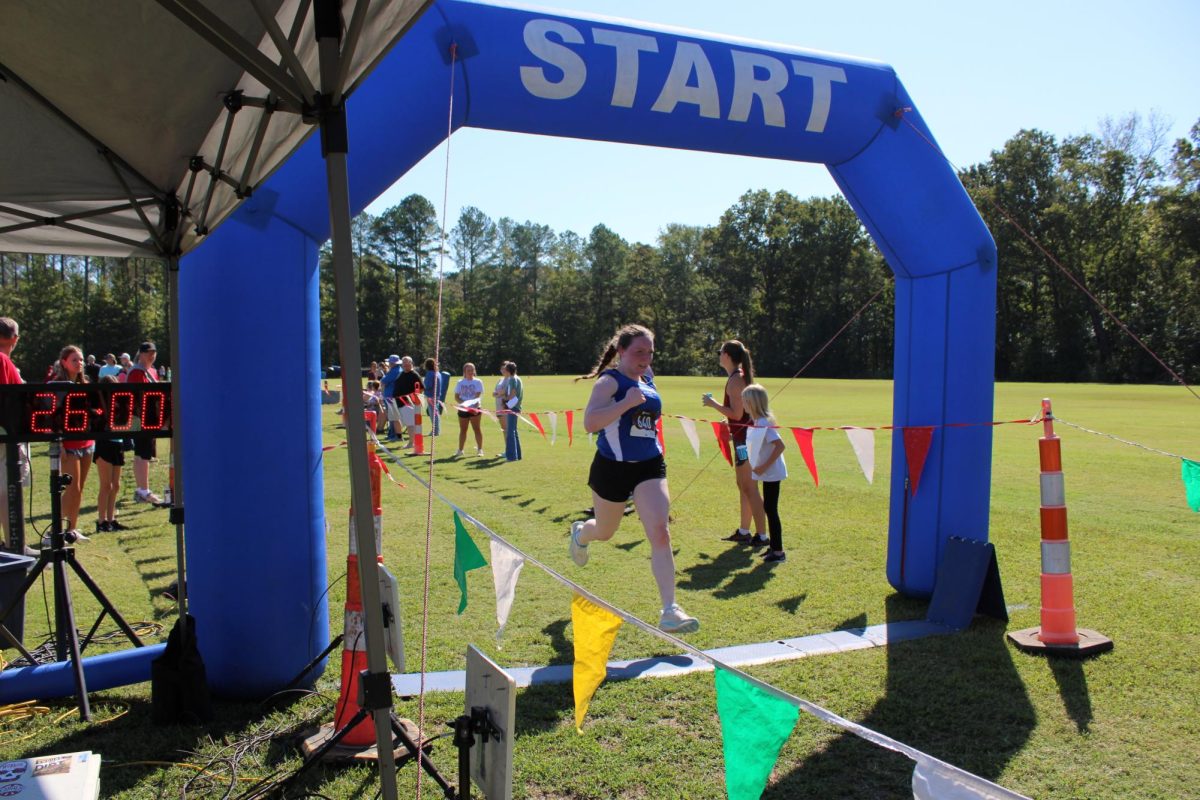



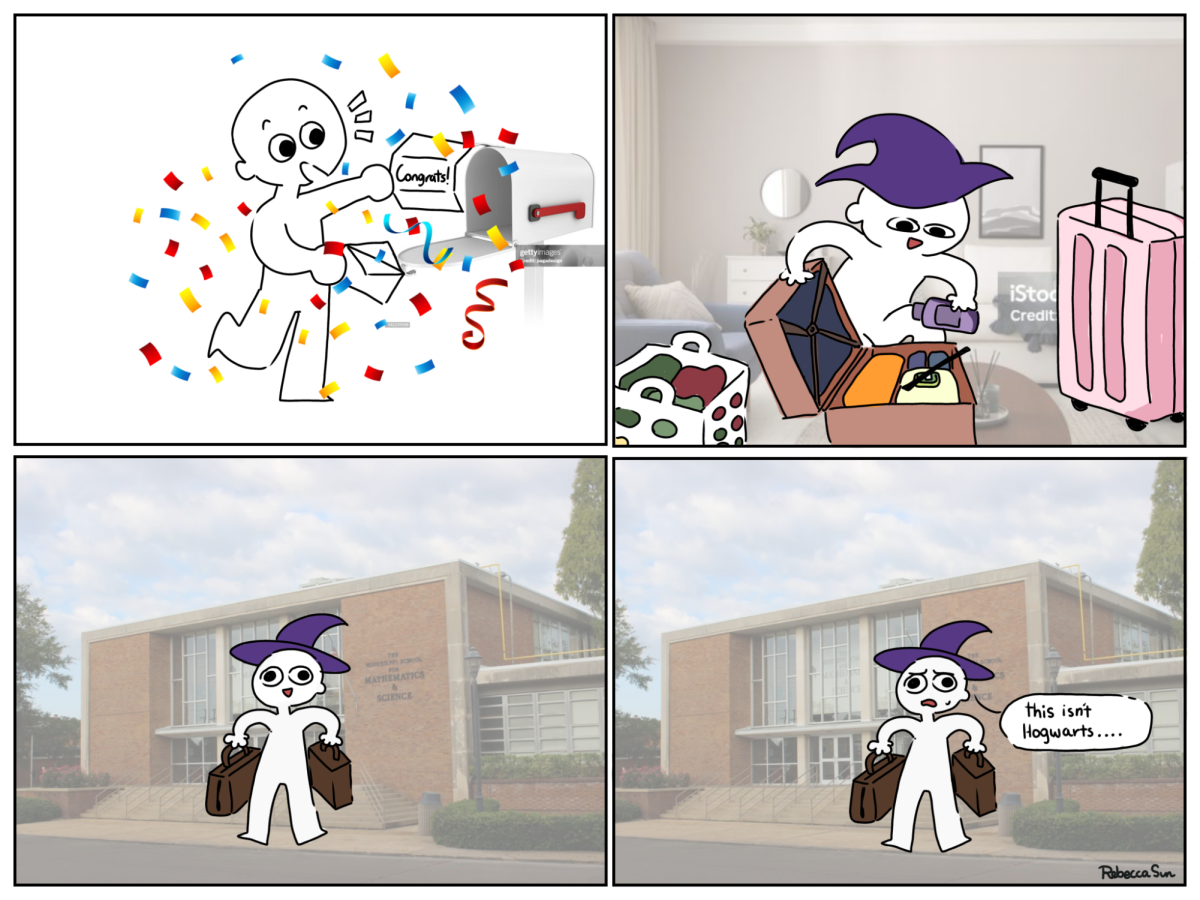
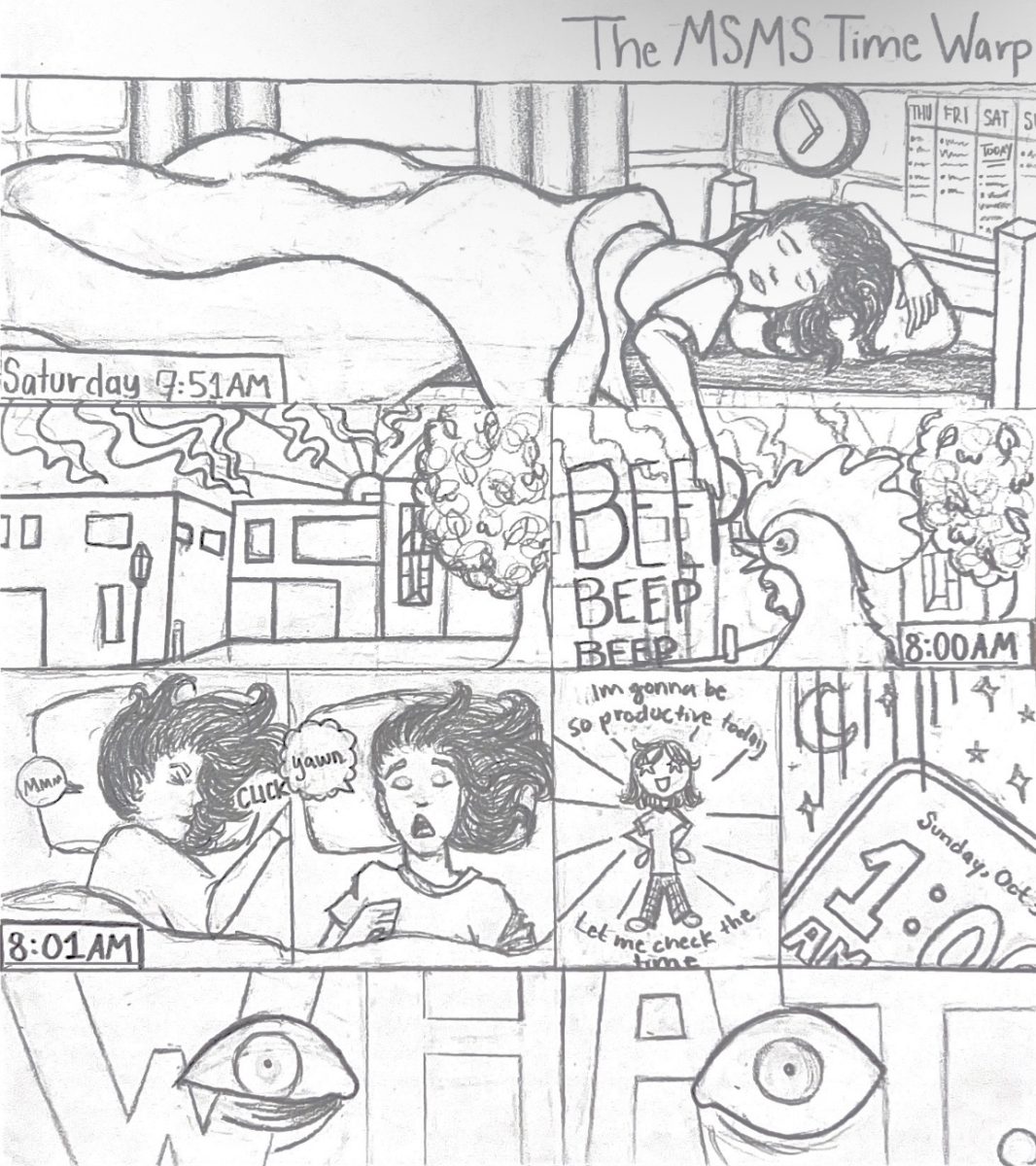

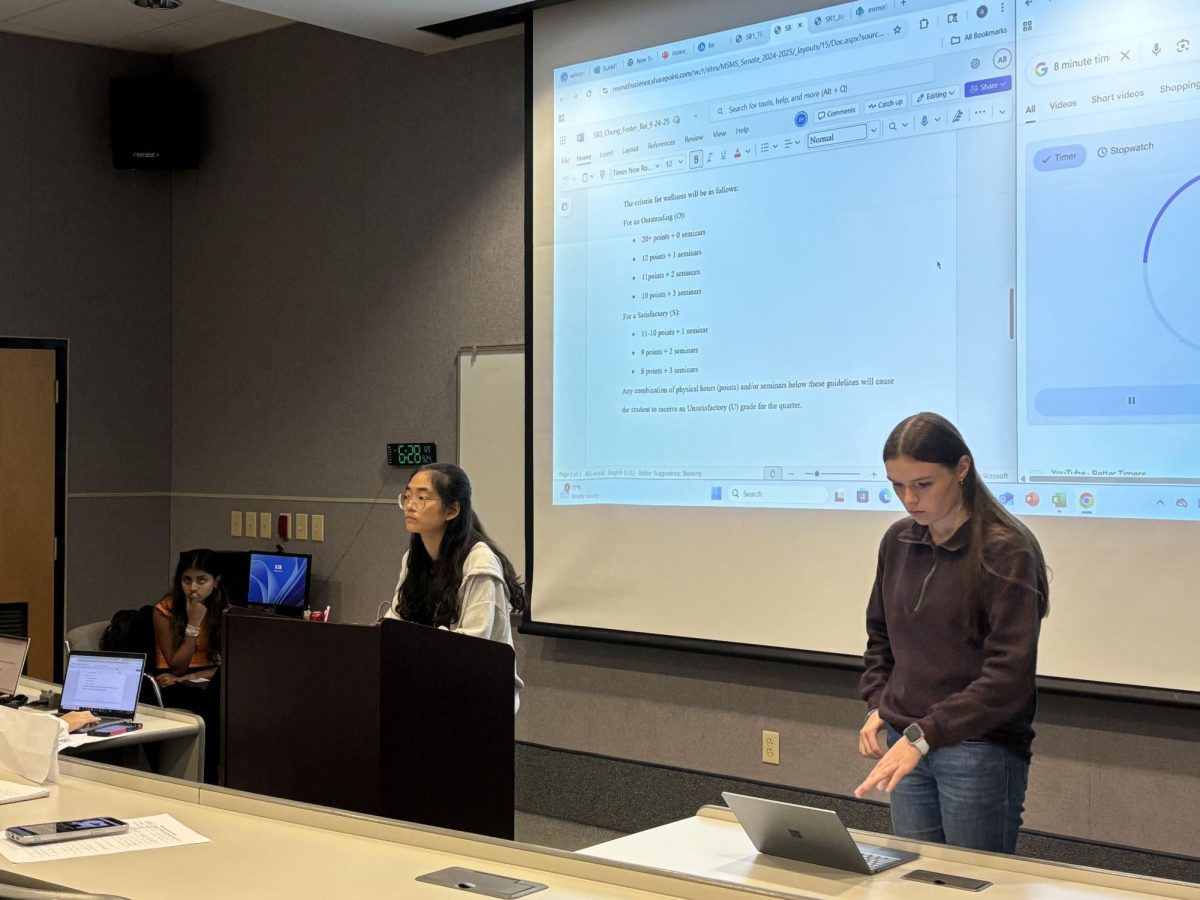




Heath Stevens • Feb 15, 2024 at 9:28 am
Readers should know that MSMS also has a semester of statistics requirement for graduation. All students must earn a total of two credits of math while enrolled at MSMS.